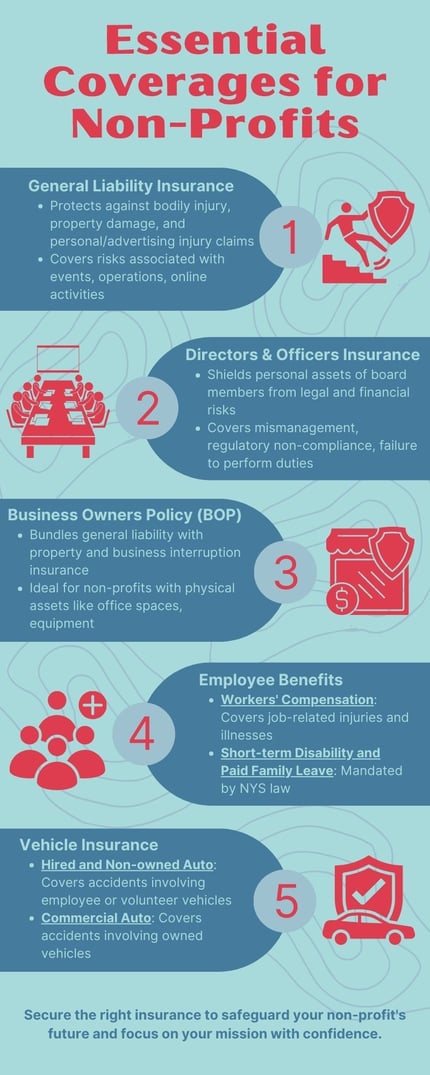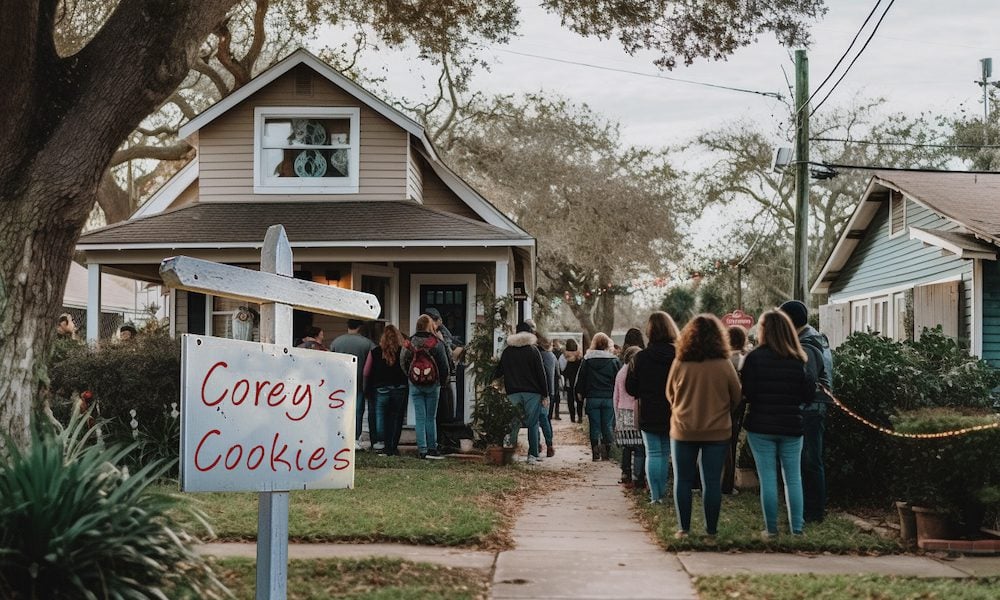Insurance Basics for CNY Non-Profit Organizations: What You Need to Know
April 1st, 2024
7 min read

As a non-profit organization in Central New York, you pour your heart into making a positive impact. But the harsh reality is that even noble missions face risks that can derail your efforts. A lawsuit, an accident, or an unforeseen incident could jeopardize everything you've worked so hard to build.
Insurance may not be the first thing on your mind, but it's a vital safeguard against potential legal and financial pitfalls.
The Horan insurance agency understands the unique challenges non-profits face. We specialize in providing tailored insurance solutions that protect your organization, so you can focus on your mission with confidence.
In this article, we’ll explore the essential coverages every non-profit needs, from general liability to directors and officers insurance. You’ll learn how to navigate the complexities of insuring your
- operations,
- events,
- employees, and
- volunteers.
With our expertise, you can fortify your non-profit against potential threats, ensuring your noble work continues uninterrupted.
The Wise Insurance Choice for Non-Profits
While insurance might not seem like an immediate need for non-profits, it’s a critical step in safeguarding your organization’s future. It’s about being prepared for those “just in case” moments that no one can predict.
The decision to insure isn’t about expecting the worst. It’s about ensuring that your organization can continue its mission even when the unexpected occurs.
Every non-profit faces unique risks, and while the hope is that nothing goes wrong, reality can sometimes have other plans. That’s why it’s prudent to consider insurance as a protective measure—a way to shield your organization from potential legal and financial challenges. It’s not about fear. It's about foresight and responsibility.
When Good Intentions Need Non-Profit Insurance: A Cautionary Tale
Let’s say a CNY non-profit has served the Liverpool community for over a decade. They’ve organized countless events and touched many lives, all without a thought to insurance. But during a routine board meeting, a new member raises a concern about the lack of insurance. The room falls silent as the reality sinks in: they’ve been operating on trust alone.
The board member shares a story of a similar organization in Fulton, Community Care, which faced a lawsuit after a fundraising event mishap. Despite their noble intentions, Community Care was held liable for injuries sustained by a guest, resulting in a substantial financial setback.
This incident had a domino effect, leading to a decline in donations and volunteer support, ultimately threatening their existence.
This scenario serves as a stark reminder that good intentions don’t exempt non-profit organizations from real-world risks. It becomes clear that insurance is not just a formality but a necessity to protect your mission, your members, and your future.
Securing the Essentials: General Liability Insurance for Non-Profits
 Navigating the complexities of insurance is critical for non-profits, beginning with general liability coverage. This essential safeguard is as vital for non-profits as it is for any business, protecting your organization from common mishaps.
Navigating the complexities of insurance is critical for non-profits, beginning with general liability coverage. This essential safeguard is as vital for non-profits as it is for any business, protecting your organization from common mishaps.
As an example, picture this scenario:
During a bustling street fair organized by your non-profit, volunteers energetically hang banners to attract more visitors. In the midst of this excitement, one banner isn’t secured properly.
Moments later, a gust of wind tears it from its moorings, and it sails into the busy street. The banner obscures the windshield of a passing car, causing the driver to swerve dramatically, resulting in a collision.
Incidents like these are stark reminders of the unpredictable nature of hosting public events. General liability insurance is essential in these situations, as it would cover the damages and legal fees associated with the accident.
This type of insurance protects your non-profit from the financial repercussions of such unforeseen events, ensuring that a momentary lapse doesn’t lead to lasting financial damage.
Navigating Online Risks with General Liability Insurance
In our interconnected world, non-profits aren’t immune to the risks that come with an online presence. General liability insurance, while traditionally associated with physical incidents, can also provide coverage for certain nonphysical risks encountered in the digital space.
For example, if your non-profit’s online content is alleged to have caused defamation or slander, general liability insurance may cover the legal defense and potential damages, protecting your organization from claims of personal and advertising injury.
These risks highlight the importance of general liability insurance for non-profits, ensuring they are protected not only during in-person events but also across their online activities. It’s a crucial layer of defense in a world where digital interactions can lead to real-world consequences.
Fortifying Leadership: The Critical Role of Directors and Officers Insurance
Directors and officers (D&O) insurance is not merely important—it is a critical component of risk management for any non-profit organization. This insurance serves as a protective barrier for the personal assets of board members, insulating them from the financial repercussions of their decision-making.
This coverage is not just a fallback—it is an essential shield that guards against personal liability for the financial losses that may arise from their governance. Even leaders who exercise the utmost diligence aren’t immune to accusations of mismanagement or oversight.
Thus, directors and officers insurance transcends recommendation—it is a fundamental necessity. It provides financial security and composure, ensuring that unforeseen circumstances do not compromise the stability of your organization or the personal wellbeing of its leaders.
How Directors and Officers Insurance Works
In the context of Central New York, where non-profit organizations are integral to the community’s fabric, D&O insurance becomes even more crucial.
D&O insurance provides protection for the personal assets of board members and officers against legal expenses arising from lawsuits. These lawsuits can be related to a variety of allegations, including but not limited to:
- Mismanaged funds: If board members are accused of poor investment decisions or misuse of funds, D&O insurance can cover the associated legal costs.
- Regulatory non-compliance: Should the non-profit fail to meet regulatory standards, D&O insurance can help cover the legal expenses that result from such lapses.
- Failure to perform duties: In cases where board members are sued for not fulfilling their legal or fiduciary duties, D&O insurance can assist with the legal defense costs.
By having D&O insurance, non-profit organizations in Central New York can attract and retain qualified individuals for their boards. These members can dedicate their time and expertise to serve with a layer of financial security and composure, knowing that their personal assets are not at risk due to their involvement in the organization.
Learn more about directors and officers insurance.
Clarifying Coverage: Business Owner’s Policy Versus General Liability
When steering a non-profit, understanding the nuances of insurance coverage is paramount. A business owner’s policy (BOP) and general liability insurance are two distinct types of policies that cater to different aspects of organizational protection.
General Liability Insurance
General liability insurance is the bedrock of any non-profit’s insurance portfolio. It provides broad coverage for claims of bodily injury, property damage, and personal and advertising injury that occur during the organization’s operations. This is the first line of defense against common risks that any event or activity might encounter.
Business Owners Policy (BOP)
A business owners policy (BOP), on the other hand, is a more comprehensive solution that bundles general liability insurance with property insurance and often business interruption insurance.
This policy is tailored for non-profits that own or manage physical assets such as office space, equipment, or inventory. It not only covers the liability aspects but also protects against property damage and loss of income due to covered events.
While general liability insurance is a starting point for risk management, a BOP extends protection to cover the assets and potential income loss, which are critical for the continuity of a non-profit. It’s a strategic choice for organizations that require a wider safety net due to their physical and operational investments.
Essential Employee Benefits: Navigating Workers Comp and Disability for Non-Profits
Non-profit organizations in New York State, regardless of size or tax status, are mandated to provide certain employee benefits. This includes
- workers compensation,
- short-term disability Insurance, and
- paid family leave.
These are not optional coverages but are required by state law to ensure the well-being of employees and the financial stability of the organization.
- Workers compensation provides benefits to employees who suffer job-related injuries and illnesses. It’s critical coverage for non-profits that employ staff, whether it’s an executive director at a Chamber of Commerce or workers at larger entities like rescue missions or the Salvation Army.
- Paid family leave offers paid time off for employees to bond with a new child or care for a seriously ill family member. It’s a separate benefit from short-term disability and is part of the state-mandated disability benefits program.
- Short-term disability insurance provides income replacement for employees who are unable to work due to non-work-related illnesses or injuries.
These benefits are designed to protect employees and volunteers, ensuring that a work-related injury or a family medical issue does not lead to financial hardship.
For non-profits, compliance with these regulations is not just about fulfilling legal obligations—it’s about affirming their commitment to the individuals who drive their mission forward.
Learn more about workers compensation and short-term disability/paid family leave.
And for a deeper dive into non-profit insurance read: “What Insurance is Needed if My Non-Profit Has Employees?”
Steering Clear of Liability: Vehicle Insurance for Non-Profits
When a non-profit organization utilizes vehicles, whether directly owned or provided by volunteers, the absence of insurance is a significant liability risk. Consider a volunteer driving to a charity function. In the event of an accident, the injured party’s claim for compensation won’t consider the organization’s non-profit status.
Without proper insurance, the organization’s finances are directly exposed to such claims.
A business owners policy that includes hired and non-owned auto coverage is indispensable in these circumstances. It affords protection when an employee or volunteer is involved in a vehicular accident during the course of organizational activities.
It’s a common misconception that non-profit status provides immunity from liability. In reality, the legal and financial exposure to risks is equivalent to that of for-profit entities.
Therefore, it’s not merely a matter of ethical practice but of astute management to secure insurance for non-profit vehicles. In the realm of liability, a non-profit operates under the same legal obligations as any other business.
In the context of non-profit operations, hired and non-owned auto insurance is a critical component for managing vehicular risks. This type of insurance provides liability coverage for accidents involving vehicles that are not owned by the non-profit but are used for its operations, such as a volunteer’s personal car or a rented vehicle.
For non-profits that own their vehicles, commercial auto insurance is necessary to cover legal bills, medical expenses, and property damage if the organization’s vehicle is involved in an accident. With comprehensive insurance, it also covers damage from non-collision events like fire, theft, animal strikes, weather or vandalism.
Both hired and non-owned auto and commercial auto coverages are essential for non-profits to protect against the financial consequences of vehicular accidents and to ensure compliance with legal obligations, just as any business would.
Properly insuring vehicles used in non-profit activities is not just prudent. It’s a fundamental aspect of responsible organizational management.
Safeguard Your Non-Profit’s Future with the Right Business Insurance
The road ahead for non-profits is paved with noble intentions, but also potential obstacles. We covered how even the most well-meaning organizations face legal, financial, and operational risks that can impede their vital work.
From liability during events to protecting leaders’ personal assets, insurance is no longer an option—it's a necessity.
By securing the right coverages, you fortify your non-profit's future, giving you the composure and security to focus on your mission wholeheartedly. Overlook these safeguards, and you leave your organization vulnerable to crippling setbacks that could undo years of progress.
Non-profits exist to better our communities, but good intentions alone cannot insulate you from harsh realities. Make the wise choice: work with an agency that understands the unique needs of Central New York non-profits.
With proper insurance, your positive impact remains uninterrupted, weathering any storm that may arise. The decision to protect your organization is an act of foresight and responsible leadership.
Click the Get a Quote button below to secure tailored coverages that safeguard your non-profit’s future.
Daniel is an accomplished content creator. He has been working in publishing for almost two decades. Horan Companies hired Daniel as its content manager in November 2022. The agency entrusted its messaging to him. Since then, Daniel has written insurance articles, service pages, PDF guides, and more. All in an effort to educate CNY readers. He's helping them understand the world of insurance so they can make informed decisions.
Topics:



























